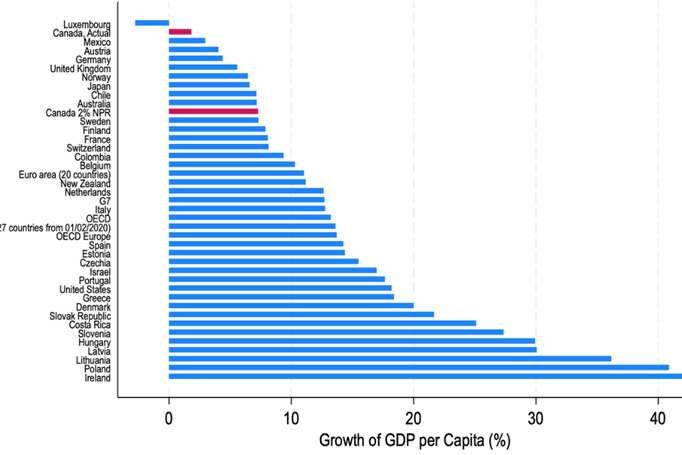By Matthew Mendelsohn | The Toronto Star
Mark Carney had a chance to weigh in one of the defining issues facing Canada. The answer he gave suggests he isn’t ready for public life
Mark Carney made a speech last week and many people had plenty to say about it. But one of his replies during the Q & A deserves more attention than it received.
MP Nate Erskine-Smith asked Carney what he would do about Canada’s growing wealth inequality. Carney’s answer was a bit unfocused, but he made two points clearly: 1) Let’s hope wealthy people give more to charity, and 2) We shouldn’t only focus on redistribution.
This was not a serious answer.
If Carney wants to play a constructive role in Canadian public life, he should have thought deeply about the staggering and growing wealth concentration in Canada and around the world. This concentration is creating anxiety and anger among many young people, it is destabilizing democratic societies and he should have something meaningful to say about it.
Given his professional history, Carney knows that the benefits from economic growth in recent decades have increasingly gone to capital rather than workers. Even if he doesn’t want to serve up big pieces of blame pie, he should at least have critical reflections on the role of finance in producing obscene wealth alongside real hardship.
Unfortunately, Carney’s instincts on wealth inequality are reflective of what has been on full display from many business leaders over the past few weeks who have been bemoaning Canada’s “productivity emergency” — and then having a bit of a fit about small changes in the capital gains tax.
We share these concerns about the long-term decline in productivity, which has real and negative consequences on our quality of life.
But Canada’s long-standing productivity challenges have been debated for three decades, their causes are not well-understood and the solutions are not obvious. We certainly shouldn’t assume that realistic solution just happen to coincidentally lineup with all the prior positions and economic interests of corporate Canada.
“Given his professional history, (Mark) Carney knows that the benefits from economic growth in recent decades have increasingly gone to capital rather than workers,” writes Matthew Mendelsohn. “Even if he doesn’t want to serve up big pieces of blame pie, he should at least have critical reflections on the role of finance in producing obscene wealth alongside real hardship.”
We are even more concerned that many of Canada’s industry leaders who shape our public debate have seemingly missed the most important economic policy debates of the past 20 years. Around the world, almost no serious person continues to believe that cutting taxes on the wealthy will unlock growth for working and middle-income people.
Most advanced industrial democracies are dealing with inequality and challenges to economic growth by rejecting market fundamentalism and investing in things like public transit, child care, affordable housing and ensuring that low- and middle-income people have money to spend in the local economy.
So, Carney’s answer was disappointing.
When he was asked about wealth inequality, Carney could have talked about his views on this emerging consensus. He could have talked about housing and its relationship to both inequality and productivity.
He could have shared his thoughts about global processes to confront wealth sheltering and corporate profit shifting.
He could have talked about how oligopolistic markets hurt working people, innovation and productivity and how we should break them up.
He could have discussed ways to get more capital into underserved communities or how we should confront the worst features of modern extractive capitalism and private equity.
And when he chose to toss the word “redistribution” on the table, he could have at least noted that we are living through a period when concentration of ownership is redistributing upwards toward the extremely wealthy. Or that it is important that we stop talking narrowly about income redistribution and focus more deeply on how to broaden ownership of the economy.
But his instinct was to say none of these things, just as the instinct of our business community when talking of productivity is to discuss their taxes rather than the housing crisis.
Authoritarian populists are winning in many places because, in part, the benefits of economic growth have been accruing disproportionately to capital. Everyone who aspires to play a constructive role in public life needs to address this head on.
Highly unequal societies — with wealth, opportunity and privilege passed along intergenerationally — are not safe, healthy or happy societies. They are not in anyone’s interest, even the wealthy.
Share with a friend
Related reading
Blame the denominator, not the economy
Over the last couple of years, there have been countless articles warning of Canada’s poor economic performance. The mic drop has increasingly been Canada’s poor performance relative to peer countries on “GDP per capita,” with growth rankings used to draw a variety of sweeping, negative conclusions about Canada’s economy. SCP CEO Matthew Mendelsohn and Policy Director Dan Skilleter draw on economist and SCP Fellow Dr. Gillian Petit's new research to explain why GDP per capita is a deeply flawed measurement for evaluating rich countries - and is easily influenced by a variety of factors having little to do with economic performance or economic well-being.
Non-Permanent Residents and their impact on GDP per capita | Summary
New research by economist and SCP Fellow Gillian Petit estimates what Canada’s GDP per capita would have been over the past decade if Canada had kept our temporary resident numbers stable. She also estimates the expected impact on GDP per capita in the coming years due strictly to planned reductions in Canada's intake of non-permanent residents. Among key findings: Canada’s GDP per capita is misleading and should not be used as if it were the sole indicator of economic well-being. Plus, if we had maintained our temporary resident numbers at two percent of the population in recent years, Canada’s GDP per capita would look much more like our peer countries: a little bit ahead of countries like Germany, the United Kingdom and Australia and a little bit lower than countries like Belgium, Sweden and France.
Non-Permanent Residents and their impact on GDP per capita | Report
New research by economist and SCP Fellow Gillian Petit estimates what Canada’s GDP per capita would have been over the past decade if Canada had kept our temporary resident numbers stable. She also estimates the expected impact on GDP per capita in the coming years due strictly to planned reductions in Canada's intake of non-permanent residents. Among key findings: Canada’s GDP per capita is misleading and should not be used as if it were the sole indicator of economic well-being. Plus, if we had maintained our temporary resident numbers at two percent of the population in recent years, Canada’s GDP per capita would look much more like our peer countries: a little bit ahead of countries like Germany, the United Kingdom and Australia and a little bit lower than countries like Belgium, Sweden and France.

